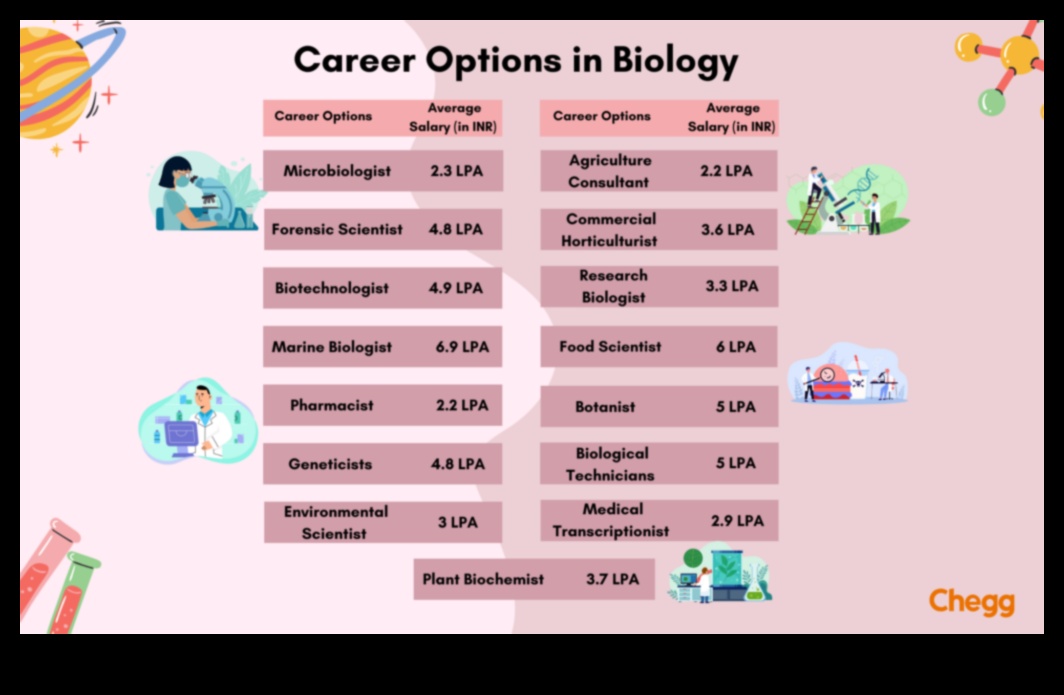
I. Introduction to Biology Jobs
Biology is the study of life and living organisms. Biology jobs are in high demand, as there are many different industries that rely on biologists to conduct research, develop new products, and provide healthcare services.

II. Types of Biology Jobs
There are many different types of biology jobs, including:
- Research Scientist
- Medical Scientist
- Environmental Scientist
- Biomedical Engineer
- Pharmaceutical Scientist
- Forensic Scientist
- Zoologist
- Botanist
- Aquarist
III. Requirements for Biology Jobs
The requirements for biology jobs vary depending on the specific job, but most biology jobs require a bachelor’s degree in biology or a related field. Some jobs may also require a master’s degree or a Ph.D.

IV. How to Get a Biology Job
There are a few things you can do to increase your chances of getting a biology job, including:
- Get good grades in your biology courses.
- Get involved in extracurricular activities related to biology.
- Network with people in the biology field.
- Gain experience through internships or research positions.

V. Salary for Biology Jobs
The salary for biology jobs varies depending on the specific job, the level of education, and the years of experience. The median annual salary for biologists is $67,140.

VI. Benefits of a Biology Job
There are many benefits to working in a biology job, including:
- The opportunity to make a difference in the world.
- The chance to work on cutting-edge research.
- The opportunity to work in a variety of industries.
- The potential for high salaries.
VII. Career Advancement in Biology
There are many opportunities for career advancement in biology. With experience and education, biologists can move into management positions, such as lab manager or research director. They can also become professors or consultants.
VIII. Challenges of a Biology Job
There are some challenges to working in a biology job, including:
- The competition for jobs can be fierce.
- The work can be demanding and stressful.
- The job may require long hours.
IX. Tips for Success in a Biology Job
Here are a few tips for success in a biology job:
- Be passionate about your work.
- Be willing to work hard.
- Be open to new challenges.
- Network with people in the field.
X. FAQs about Biology Jobs
Here are some frequently asked questions about biology jobs:
- What is the difference between a biologist and a biochemist?
- What are the best biology jobs for people who want to make a difference in the world?
- What are the most in-demand biology jobs?
- What are the best biology jobs for people who like to work outdoors?
| Topic | Feature |
|---|---|
| Biology careers | List of different types of biology jobs |
| Biology jobs | Salary potential for biology jobs |
| Biology degree | Required education and experience for biology jobs |
| Biology major | Job outlook for biology majors |
II. Types of Biology Jobs
There are many different types of biology jobs available, each with its own unique set of requirements and responsibilities. Some of the most common types of biology jobs include:
- Research Scientist
- Lab Technician
- Environmental Scientist
- Medical Scientist
- Teacher
- Pharmaceutical Sales Representative
- Science Writer
- Bioinformatician
- Genetic Counselor
These are just a few of the many different types of biology jobs that are available. The specific type of job that you pursue will depend on your interests, skills, and educational background.
III. Requirements for Biology Jobs
The requirements for biology jobs vary depending on the specific job role, but some general requirements include:
- A bachelor’s degree in biology or a related field
- Strong analytical and problem-solving skills
- Excellent communication and interpersonal skills
- Ability to work independently and as part of a team
- Interest in and passion for biology
IV. How to Get a Biology Job
There are a few things you can do to increase your chances of getting a biology job.
- Get a good education. A strong foundation in biology is essential for any biology job. Make sure to take courses in all the major areas of biology, including cell biology, genetics, molecular biology, and ecology.
- Gain experience. In addition to your coursework, you should also try to gain some experience in the field of biology. This could include volunteering for a research project, working in a lab, or getting a part-time job in a biology-related field.
- Network. Talk to your professors, classmates, and other professionals in the field of biology. Let them know that you’re looking for a job and ask them if they know of any openings.
- Use online job boards. There are many online job boards that list biology jobs. Be sure to regularly check these boards for new openings.
- Apply for jobs. Once you’ve found a few jobs that you’re interested in, apply for them. Be sure to tailor your resume and cover letter to each specific job.
By following these tips, you can increase your chances of getting a biology job.
V. Salary for Biology Jobs
The median annual salary for biologists was $68,300 in 2020. The top 10% of earners made more than $104,310, while the bottom 10% made less than $44,350.
The salary for biologists varies depending on a number of factors, including education level, experience, industry, and location.
Biologists with a bachelor’s degree typically earn less than those with a master’s degree or doctorate.
Biologists with more experience typically earn more than those with less experience.
Biologists who work in the pharmaceutical industry typically earn more than those who work in other industries.
Biologists who live in high-cost areas typically earn more than those who live in low-cost areas.
Overall, the salary for biologists is competitive with other science-related fields. However, the salary potential for biologists can vary significantly depending on a number of factors.
VI. Benefits of a Biology Job
There are many benefits to working in a biology job. Some of the most common benefits include:
Opportunity to make a difference in the world. Biology jobs often involve working on projects that have the potential to make a positive impact on the world. For example, biologists may work on developing new drugs to treat diseases, or on finding ways to protect the environment.
Variety of job opportunities. There are many different types of biology jobs available, so there is likely a job that is a good fit for your interests and skills. Biology majors can find jobs in a variety of industries, including healthcare, research, and education.
High salary potential. Biology jobs typically pay well, and the salary potential can increase with experience and education. According to the Bureau of Labor Statistics, the median annual salary for biologists was $84,870 in 2020.
Job security. Biology is a growing field, and there is a high demand for qualified biologists. The Bureau of Labor Statistics projects that employment for biologists will grow by 7% from 2020 to 2030, which is faster than the average for all occupations.
Excellent work-life balance. Many biology jobs offer good work-life balance. Biologists typically work regular hours, and they may have the opportunity to work from home or in a flexible work environment.
VII. Career Advancement in Biology
There are many opportunities for career advancement in biology. With experience and education, biologists can move into management positions, such as lab director or research manager. They can also become independent consultants or start their own businesses.
Biologists who are interested in teaching can pursue a career in academia. With a PhD, they can become professors at colleges and universities. They can also teach at community colleges or high schools.
Biologists who are interested in government work can find jobs with federal, state, and local agencies. They can work on a variety of projects, such as environmental research, wildlife conservation, or public health.
Biologists who are interested in the private sector can find jobs with pharmaceutical companies, biotechnology companies, environmental consulting firms, and medical device companies. They can work on a variety of projects, such as developing new drugs, testing new medical devices, or conducting environmental impact assessments.
The career advancement opportunities in biology are vast and varied. With hard work and dedication, biologists can achieve their career goals.
Challenges of a Biology Job
There are a number of challenges that can be associated with a career in biology. These include:
-
The job market for biology majors is competitive.
-
Biology jobs can be demanding and require long hours.
-
Biology jobs can be stressful, as they often involve working with hazardous materials or animals.
-
Biology jobs can require a lot of travel.
Despite these challenges, a career in biology can be rewarding and fulfilling. Biology majors have the opportunity to work on cutting-edge research, make a difference in the world, and help people.
IX. Tips for Success in a Biology Job
Here are some tips for success in a biology job:
-
Be passionate about your work.
-
Be willing to learn and grow.
-
Be organized and efficient.
-
Be able to work independently and as part of a team.
-
Communicate effectively both verbally and in writing.
-
Be willing to take risks and try new things.
-
Be persistent and never give up on your dreams.
By following these tips, you can increase your chances of success in a biology job.
X. FAQs about Biology Jobs
Here are three common FAQs about biology jobs, along with answers to each question:
Question 1: What are the different types of biology jobs?
There are many different types of biology jobs, each with its own unique set of responsibilities and requirements. Some of the most common types of biology jobs include:
- Research scientist
- Medical scientist
- Environmental scientist
- Forensic scientist
- Biomedical engineer
Question 2: What is the salary potential for biology jobs?
The salary potential for biology jobs varies depending on the type of job, the level of education and experience, and the location. According to the Bureau of Labor Statistics, the median annual salary for biologists was $72,850 in 2020. However, salaries can range from as low as $43,680 to as high as $127,330.
Question 3: What are the required education and experience for biology jobs?
The required education and experience for biology jobs varies depending on the type of job. However, most biology jobs require at least a bachelor’s degree in biology or a related field. Some jobs may require a master’s degree or a Ph.D., especially for research positions.